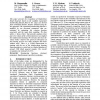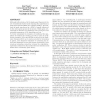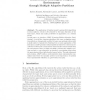286 search results - page 18 / 58 » Using inaccurate models in reinforcement learning |
ITNG
2007
IEEE
14 years 2 months ago
2007
IEEE
This paper presents the recognition of Handwritten Hindi Numerals based on the modified exponential membership function fitted to the fuzzy sets derived from normalized distance f...
ATAL
2003
Springer
14 years 28 days ago
2003
Springer
Although well understood in the single-agent framework, the use of traditional reinforcement learning (RL) algorithms in multi-agent systems (MAS) is not always justified. The fe...
AAAI
2008
13 years 10 months ago
2008
Potential-based shaping was designed as a way of introducing background knowledge into model-free reinforcement-learning algorithms. By identifying states that are likely to have ...
AIIA
2007
Springer
14 years 1 months ago
2007
Springer
The application of Reinforcement Learning (RL) algorithms to learn tasks for robots is often limited by the large dimension of the state space, which may make prohibitive its appli...
ATAL
2007
Springer
14 years 1 months ago
2007
Springer
Reinforcement learning promises a generic method for adapting agents to arbitrary tasks in arbitrary stochastic environments, but applying it to new real-world problems remains di...



